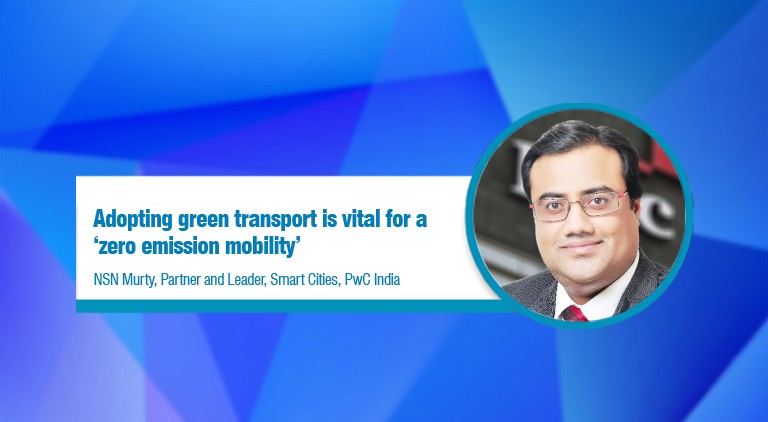Adopting green transport is vital for a ‘zero emission mobility’
By EPR Magazine Editorial July 8, 2019 4:48 pm IST
By EPR Magazine Editorial July 8, 2019 4:48 pm IST

Buoyant and sustainable infrastructure must be planned to realise the long-term development goal.
NSN Murty, Partner and Leader, Smart Cities, PwC India
NSN Murty, Partner and Leader, Smart Cities, PwC India, discusses on alternatives to inclination towardssustainable transport modules and reduce the carbon emission in the environment.
What’s the status of Smart Cities Mission, four years after launch of ‘100 smart cities by 2020’?
For a smart city, planning and development is an incessant evolving landscape, surrounded by numerous externalities. After almost four years from the launch of Smart Cities, 100 cities are envisaged on the path to become ‘smart’ under the mission. Over 6,000 projects are conceptualised in all the 100 smart cities with an overall budget of over ₹ 2 lakh crores. Almost 90 per cent of the cities have a SPV in place, which ensures to design, implement and monitor the projects, and these SPVs have strong financial backing from both the central and state governments.
Considering the development’s speed across cities, it would be irrational to put same yardstick of progress across all 100 smart cities, as these cities were nominated in the initial rounds and are yielding promising results, whereas the remaining cities are gearing to catch the lighthouse cities.
How durable is the current regulatory framework when it comes to smart cities?
The regulatory framework for smart cities needs to be reinforced due to huge flux of data generated by city and its citizens. Data privacy laws have become an ultimate priority for the government to safeguard citizen’s private information and critical data statistics. Though MoUHA has framed guidelines for cyber security framework, but a legal regulation for privacy and personal data is still missing at large.
Furthermore, the SPV model at city level was envisioned to build an ecosystem for speedy implementation of the project, but, there are deep concerns while implementing them on ground. Two critical areas which needs improvement from regulatory perspective are, reducing and streamlining the equipped time for project clearance and data laws or policies which governs the data security.
How do you define the key principles for designing smart cities?What according to you are some of the biggest roadblocks in the development of smart cities in India?
Firstly, project clearance, in the current governance, creation of special purpose vehicle (SPVs) take 15-18 months and time taken for approvals and clearances of projects. Secondly, when projects require private financing in the light of PPP models. And, a transformational approach is required to build capacity of City Authorities to re-imagine projects with technological solutions and leave behind the old traditional ways of project conceptualisation.
A smart city requires seamlessly interconnected devices which constantly transfer real time data. In that case, aren’t the smart cities highly vulnerable to cyber theft?
The Smart City mission will aid to create an ecosystem, conducive to sustaining masses, with limited resources, and digital technologywill propel smart cities. However, the adoption of technology has its own challenges, for example, cyber-attacks and the risk of privacy violation, and India cannot afford to have inadequately secured smart cities. Hence, the cyber security needs to be ingrained in the systems right from beginning or during the implementation phase. So, few policies and regulations has been designed to protect smart city infrastructure from these attacks. Some of the existing/upcoming regulations on security and privacy are also applicable to smart cities, thereby helping to build secure cities
How do you view the importance of gearing up for an electric vehicle future in greener smart cities?
Adoption of electric vehicles and creation of supportive charging infrastructure is a vital step, that’s already accepted by several other countries.India will soon replace the existing petrol and diesel vehicles by electric ones by 2030. Though the ambition is in the right direction, we have to be cognizant of the challenges associated with introduction of electric vehicles.Currently, electric vehicles are being sold at a much higher rate than their traditional counterparts.
Other critical questions include how the power required for charging these vehicles would be generated, whether we have enough resources to produce electric batteries. Government’s initiatives like, Faster Adoption and Manufacturing of (Hybrid &) Electric Vehicles (FAME-India) Scheme, which proposes to give a momentum to electric vehicles (EVs) in public transport and Vehicle to Grid (V2G), where electric vehicles can be used as mobile energy storage devices.
How should the newly elected government and policy makers approach the planning of smart cities?
Smart planning for smart cities is priority for the government. The Smart Cities Mission has achieved several milestones and is moving forward in the right direction. There are few road-blocks that needs to be addressed and there are few suggestions for the same. SPV’s to have clear delegation of authority from the state, enabling them to take financial and procurement decisions at city level without additional approvals from various other departments.
We use cookies to personalize your experience. By continuing to visit this website you agree to our Terms & Conditions, Privacy Policy and Cookie Policy.